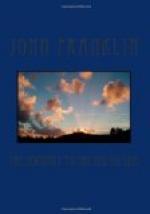The weather during this month was the coldest we experienced during our residence in America. The thermometer sank on one occasion to 57 degrees below zero and never rose beyond 6 degrees above it; the mean for the month was minus 29.7 degrees. During these intense colds however the atmosphere was generally calm and the woodcutters and others went about their ordinary occupations without using any extraordinary precautions yet without feeling any bad effects. They had their reindeer shirts on, leathern mittens lined with blankets, and furred caps; but none of them used any defence for the face, or needed any. Indeed we have already mentioned that the heat is abstracted most rapidly from the body during strong breezes and most of those who have perished from cold in this country have fallen a sacrifice to their being overtaken on a lake or other unsheltered place by a storm of wind. The intense colds were however detrimental to us in another way. The trees froze to their very centres and became as hard as stones and more difficult to cut. Some of the axes were broken daily and by the end of the month we had only one left that was fit for felling trees. By entrusting it only to one of the party who had been bred a carpenter and who could use it with dexterity it was fortunately preserved until the arrival of our men with others from Fort Providence.
A thermometer hung in our bedroom at the distance of sixteen feet from the fire but exposed to its direct radiation stood even in the daytime occasionally at 15 degrees below zero, and was observed more than once previous to the kindling of the fire in the morning to be as low as 40 degrees below zero. On two of these occasions the chronometers 2149 and 2151 which during the night lay under Mr. Hood’s and Dr. Richardson’s pillows stopped while they were dressing themselves.
The rapid at the commencement of the river remained open in the severest weather although it was somewhat contracted in width. Its temperature was 32 degrees, as was the surface of the river opposite the house about a quarter of a mile lower down tried at a hole in the ice through which water was drawn for domestic purposes. The river here was two fathoms and a half deep and the temperature at its bottom was at least 42 degrees above zero. This fact was ascertained by a spirit thermometer in which, probably from some irregularity in the tube, a small portion of the coloured liquid usually remained at 42 degrees when the column was made to descend rapidly. In the present instance, the thermometer standing at 47 degrees below zero with no portion of the fluid in the upper part of the tube, was let down slowly into the water but drawn cautiously and rapidly up again, when a red drop at plus 42 degrees indicated that the fluid had risen to that point or above it. At this period the daily visits of the sun were very short and, owing to the obliquity of his rays, afforded us little warmth or light. It is half-past eleven before he peeps over a small ridge of hills opposite to the house, and he sinks in the horizon at half-past two. On the 28th Mr. Hood, in order to attain an approximation to the quantity of terrestrial refraction, observed the sun’s meridian altitude when the thermometer stood at 46 degrees below zero, at the imminent hazard of having his fingers frozen.




